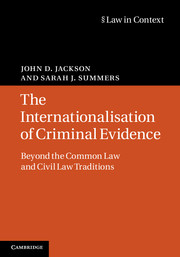Book contents
- Frontmatter
- Contents
- Foreword
- Preface and acknowledgements
- Abbreviations
- Table of international cases
- Part I Evidentiary contexts
- 1 Evidence across traditions
- 2 The common law tradition
- 3 Evidential traditions in continental European jurisdictions
- 4 The international human rights context
- 5 Evidence in the international criminal tribunals
- Part II Evidentiary rights
- Index
- References
5 - Evidence in the international criminal tribunals
Published online by Cambridge University Press: 05 June 2012
- Frontmatter
- Contents
- Foreword
- Preface and acknowledgements
- Abbreviations
- Table of international cases
- Part I Evidentiary contexts
- 1 Evidence across traditions
- 2 The common law tradition
- 3 Evidential traditions in continental European jurisdictions
- 4 The international human rights context
- 5 Evidence in the international criminal tribunals
- Part II Evidentiary rights
- Index
- References
Summary
Towards an international system of justice
In the last chapter we discussed the attempts that have been made to fashion a common law of criminal evidence within international human rights regimes and we argued that the European Court of Human Rights in particular has been developing within its jurisprudence a participatory model of proof that is rooted in both common and civil law traditions, but may be genuinely classified as sui generis. These regimes marked an important turning point for international law, as they shifted the focus away from the interests of states towards the interests of individuals. The individual rights theories that developed during the Enlightenment were re-invigorated within the international arena as the treatment of individuals by states became a matter of international concern. But these regimes were still state-centred in the sense that their rulings were concerned with whether states had met their obligations towards individuals, such as the obligation to ensure a fair trial. For our purposes, we have seen that they tolerated a fair degree of divergence between states as to how fair trials could be achieved. When international law took a further step towards recognising the significance of the individual by making individuals responsible for international crimes, however, agreement had to be reached not only on the principles of fair trial, but also on detailed rules of procedure and evidence for trying persons charged with such crimes.
- Type
- Chapter
- Information
- The Internationalisation of Criminal EvidenceBeyond the Common Law and Civil Law Traditions, pp. 108 - 148Publisher: Cambridge University PressPrint publication year: 2012

